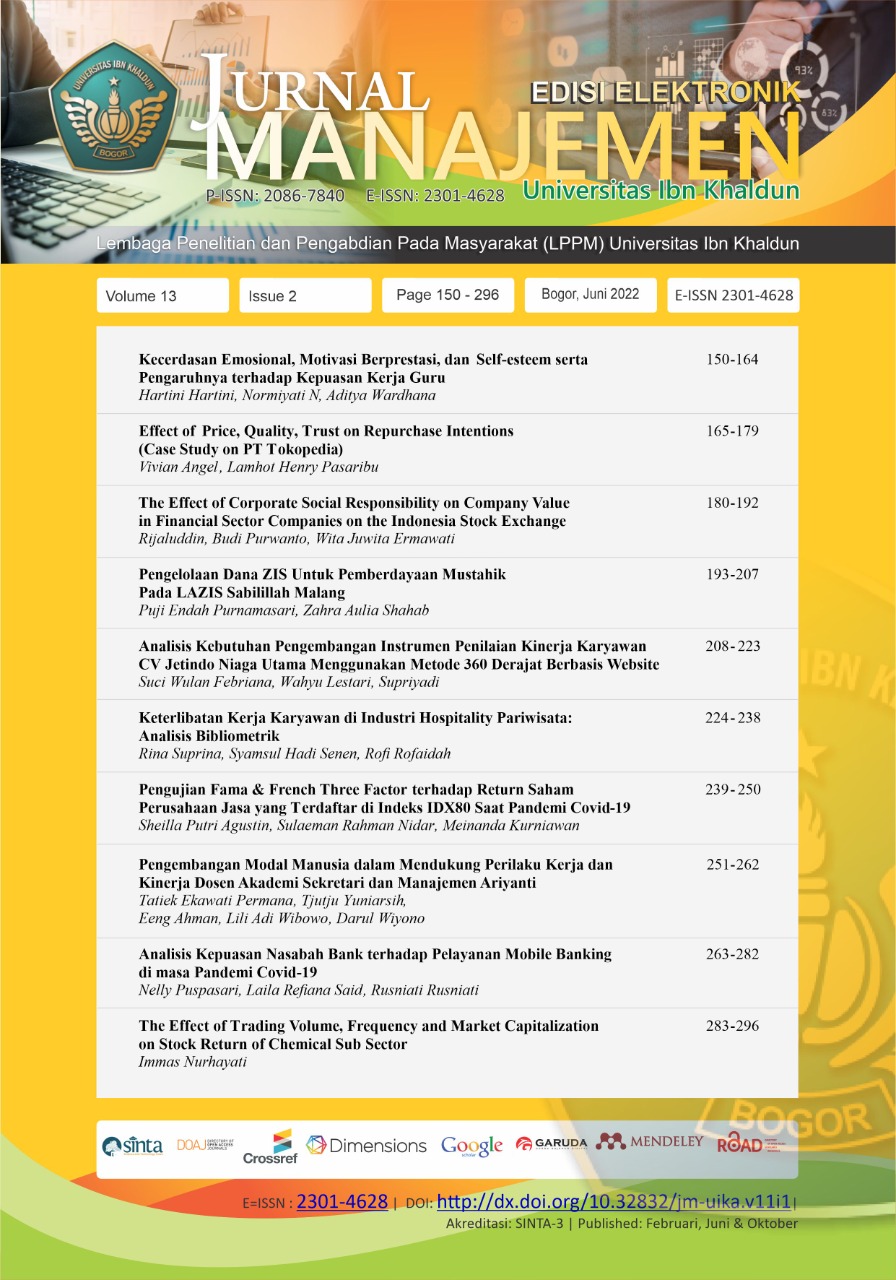Pengelolaan Dana ZIS Upaya Memperdayakan Ekonomi Masyarakat Dhuafa Pada LAZIS Sabilillah Malang
DOI:
https://doi.org/10.32832/jm-uika.v13i2.4827Keywords:
Fund Management, ZIS, Economic EmpowermentAbstract
A B S T R A C T
Zakat in the study of fiqh is the cleansing of property owned by a person. This aims to share rizki with others because in every property owned by a person there are other people's rights that must be issued. With the existence of zakat is expected to be able to even out the welfare of the surrounding community. Good and right management of zakat funds is an effort to improve the benefit of the surrounding community. Therefore, zakat, infaq and shodaqoh (ZIS) are usually managed by an official and legal entity that is trusted by the community to manage the ZIS funds properly. Usually these funds are managed through certain programs so that they are expected to be able to distribute the zakat funds evenly and on target. One of the ZIS institutions in Malang is LAZIS Sabilillah, which has long developed and is trusted by the community to channel ZIS funds which are sought as a welfare program for the poor.This research uses a descriptive qualitative approach. The object of this research is LAZIS Sabilillah Malang. Data collection includes observation, interviews and documentation. The analysis used in this research is collecting data, presenting data and finding conclusion.
The results of this study indicate that LAZIS Sabilillah manages ZIS funds by implementing several empowerment programs, namely the Guidance Program, Sabilillah Entrepreneur Education (SEI), Mustahik Welfare (Bina Usaha), Routine Incentives for Koran Teachers and Takmir Musolla fostered and compensation for 8 existing donations (Fakir , Poor, Ghorim, Musafir, Mualaf) to develop productive zakat funds for poor people. LAZIS Sabilillah carries out supervision of mustahik in two ways, both from an economic perspective and for worship as a basis for evaluation. In addition, LAZIS Sabilillah also strives to improve Mustahik's economy by providing business coaching and providing venture capital.
References
Ali, Khalifah Muhammad dkk. (2016). Perbandingan Zakat Produktif dan Zakat Konsumtif dalam Meningkatkan Kesejahteraan Mustahik. Jurnal Al- Muzara'ah, 4 (1), 19-32.
Al-Qardhawi Yusuf. 2007. Fiqh al-Zakah. Beirut: Muassasah al-Risalah
Al- Qur'an dan Hadist
Anggraeni, Linda. (2018). Analisis Manajemen Pengelolaan Dana Zakat, Infaq, dan Shadaqah (ZIS) Dalam Meningkatkan Kesejahteraan Mustahiq (Studi Pada BMT Al-Hasanah Sekampung Lampung Timur, Skripsi. Fakultas Ekonomi dan Bisnis Islam Universitas Islam Negeri Raden Intan, Lampung. Diakses dari http://repository.radenintan.ac.id
Ansori, Teguh. (2018). Pengelolaan Dana Zakat Produktif Untuk Pemberdayaan Mustahik Pada LAZISNU Ponorogo. Jurnal Muslim Heritage, 3 (1), 165-183. 2502-5341. DOI 10.21154/muslimheritage.v3i1.1274
Arikunto, Suharsimi. (2002). Prosedur Penelitian – Suatu Pendekatan Praktek, Cetakan Kedua Belas (Edisi Revisi V). Jakarta: PT. Rineka Cipta
Barkah, Qodariah dkk. (2020). Fikih Zakat, Sedekah, Dan Wakaf. Jakarta: PRENAMEDIA GROUP.
Djuanda, Gustian. (2006). Pelaporan Zakat Pengurang Pajak Penghasilan. Jakarta: PT Raja Grafindo Persada.
Fattah, Abu Ahmad Abdul. (2011). Bersedekahlah dan Tunggu Keajaiban yang Akan Ter-jadi. Solo: As-Salam Publishing
Hasibuan, Malayu S.P. (2011). Manajemen: Dasar, Pengertian dan Masalah. Jakarta: Bumi Aksara
Herdiansyah, Haris. (2010). Metode Penelitian Kualitatif untuk Ilmu-ilmu social. Jakarta: Salemba Humanika.
Khasanah, Umrotul. (2010). Manajemen Zakat Modern: Instrumen Pemberdayaan Ekonomi Umat. Malang: UIN-Maliki Press
Muzdalifah, Nazia Nadia. (2019). Analisis Pendayagunaan Zakat Produktif Dalam Pening-katan Pendapatan Mustahik Melalui Program Bangkit Usaha Mandiri Sukabumi (BUMI). Jurnal Akuntansi Terapan Indonesia, 2 (2), 41-47. 2615-0689. DOI: 10.18196/jati.020216
Nugrahani, Imas Rosi., Mulyawisdawati, Richa Angkita. (2019). Peran Zakat Produktif dalam Pemberdayaan Ekonomi Mustahiq (Studi Kasus Lembaga Amil Zakat Dom-pet Dhuafa Republika Yogyakarta 2017). Jurnal Ekonomi Syariah Indonesia, 9 (1), 30-41. 2503-1872. DOI:10.21927/jesi.2019.9(1).30-41
Nugroho, Dian Ari. (2017). Pengantar Manajemen untuk Organisasi Bisnis, Publik Dan Nirlaba. Malang: UB Press
Rabitha, Daniel. (2018). Pemberdayaan Dana ZIS (Zakat, Infaq, Shadaqah) dan Kesejahter-aan Sosial (Studi Kasus Pada BAZNAS Kabupaten Serang). Jurnal Binas Islam, 11 (4), 671-692. 2657-1189. DOI: 10.37302/jbi.v11i4.66
Ramayulis. (2008). Ilmu Pendidikan Islam. Jakarta: Kalam Mulia
Rozalinda. (2015). Ekonomi Islam. Jakarta: PT. Raja Grafindo Persada
Sule, Ernie Tisnawati., Saefullah, Kurniawan. (2006). Pengantar Manajemen. Jakarta: Kencana
Thamrin, Juni., Cholitin, Erna Erawati. (1997). Pemberdayaan dan Refleksi Finansial Usaha Kecil di Indonesia. Bandung: Yayasan Akita
Widiastuti, Tika., Rosyidi, Suherman. (2015). Model Pendayagunaan Zakat Produktif Oleh Lembaga Zakat dalam Meningkatkan Pendapatan Mustahiq. Jurnal Ekonomi dan Bisnis Islam (JEBIS), 1 (1), 89-102. 2527-3027. DOI: 10.20473/jebis.v1i1.1424
www.infoanda.com diakses pada 27 Agustus 2020
Downloads
Published
How to Cite
Issue
Section
License
Authors who publish with this journal agree to the following terms:
- Authors retain copyright and grant the journal right of first publication with the work simultaneously licensed under a Creative Commons Attribution-NonCommercial-ShareAlike 4.0 International License that allows others to share the work with an acknowledgement of the work's authorship and initial publication in this journal.
- Authors can enter into separate, additional contractual arrangements for the non-exclusive distribution of the journal's published version of the work (e.g., post it to an institutional repository or publish it in a book), with an acknowledgement of its initial publication in this journal.
- Authors are permitted and encouraged to post their work online (e.g., in institutional repositories or on their website) prior to and during the submission process, as it can lead to productive exchanges, as well as earlier and greater citation of published work (See The Effect of Open Access).











